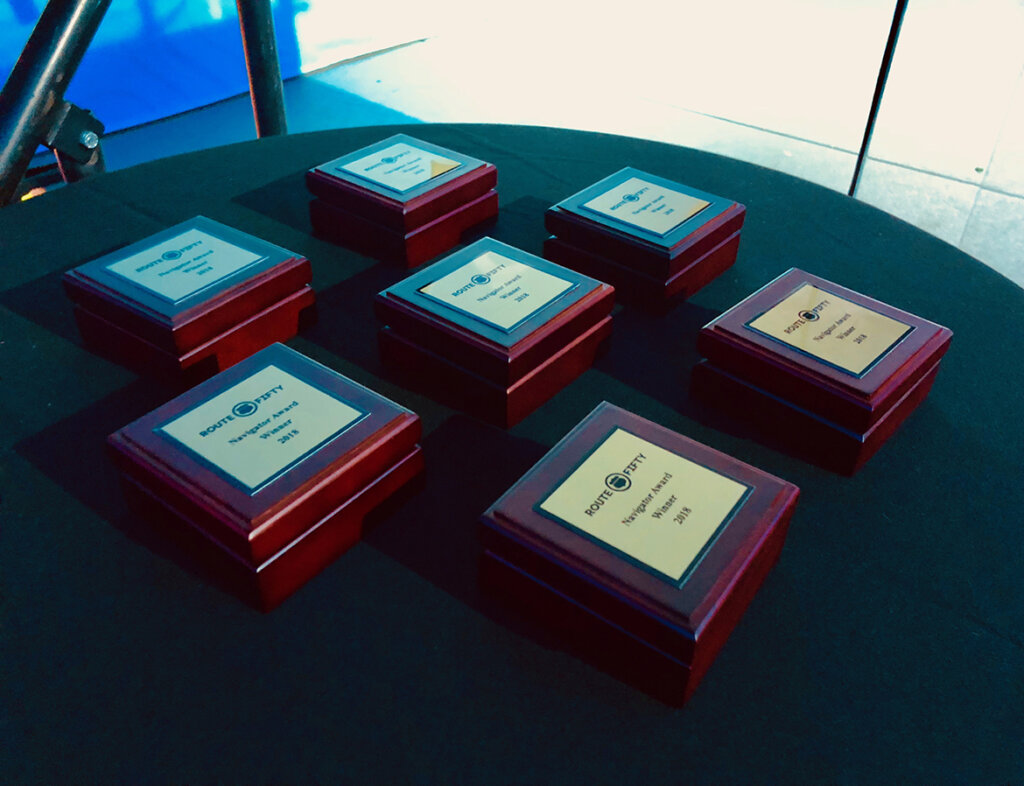The Awards Spotlighted Individuals and Organizations that Delivered Transformative Services in 2018

Accela customers took home a sizable share of this year’s Route Fifty Navigator Awards, representing six out of the 10 winners.
Coinciding with the first night of the National League of Cities City Summit, Route Fifty presented the awards at a special ceremony in the GRAMMY Museum in downtown Los Angeles. The event honored the Accela customers of California; Tennessee; Boston; New York City; Arlington, Texas; San Jose, California; and St. Louis, Missouri for their transformative efforts and initiatives in their communities. They were joined by Las Vegas, Alaska, Louisiana and the Michigan Economic Development Corporation.
In an announcement, Route Fifty’s Executive Editor Michael Grass, praised the winners and finalists for “excellence in state and local government” and their “implementation of innovative and impactful ideas.” Route Fifty launched the Navigator Awards in 2016 to call out individuals, departments and organizations that offer fellow leaders insights for new processes, projects and strategies.
In 2018, finalists were divided within five categories. These included The Leaders, a category to spotlight impactful leadership; Tech Innovators, for digital ingenuity; The Electeds, a category honoring elected officials that drive change; The Allies, for community focused innovation; and The Next Generation, for those initiatives with visionary or far-reaching ambitions.
Below is a list of winners and descriptions from Route Fifty of their award-winning projects and initiatives. Visit Route Fifty for a complete list of the 50 finalists and added details on winners.
The Leaders
Chief Don Crowson and Team, Arlington Fire Department, City of Arlington, Texas
In-Home Preventative Care Saves Money and Supports Residents Health
Crowson’s fire department and paramedics have built out the Community Paramedic Program, providing home-based medical care and social services to high-risk city residents before the situation gets dire. In providing preventative medical support and teaching residents to take care of chronic conditions, the agency substantially reduced demand for emergency response services and medical costs. The city has saved hundreds of thousands of dollars in fleet mileage costs alone, and over a million dollars in medical costs to the hospital.
Mathew Sanders, Resilience Program and Policy Administrator, Office of Community Development, Disaster Recovery Unit, State of Louisiana
Louisiana’s Strategic Adaptations for Future Environments (LA SAFE)
While Sanders’ efforts resettling residents of Louisiana’s rapidly disappearing Isle de Jean Charles made national news in the last few years, many others in the state face similar threats from climate change. To that end, he developed and is heading implementation of LA SAFE, an effort to encourage community awareness and plans for adapting to climate change. Meeting with over 3,000 residents in 71 community meetings across 6 parishes, communities developed their own plans and residents voted on their preferences. As a result, the state will be putting $40 million into ten projects this year alone.
Tech Innovators
Michael Sherwood, Director of Information Technology, City of Las Vegas
Autonomous Vehicle and Smart City Trailblazer
Self-driving vehicles, big data and smart city technology hold great promise, but cutting edge projects are often as much flair as practical substance. For the city of Las Vegas and their civic tech leader Sherwood, turning next generation technology awe into civic promise is what they are all about. The city has become a testing ground for how to integrate these cutting edge technologies. Sherwood has championed over 20 technology projects across the city, though their autonomous vehicle pilot program, which integrates a free self-driving public shuttle into the city’s intelligent traffic systems, has probably gotten the bulk of it. Long-term, the hope is the autonomous shuttle technology that is exciting tourists exploring the Fremont East Entertainment District becomes a sustainable public transit system for the region. Beyond autonomous vehicles, Sherwood and his team will continue to tinker with the rapidly deploying sensors around the city to reduce congestion, improve air quality and improve emergency response. In very Vegas fashion, the city hopes building the city of the future will be another tourism draw for a city already known for its spectacle.
Shireen Santosham and Team, Mayor’s Office of Technology and Innovation & City Manager’s Office of Civic Innovation & Digital Strategy, City of San José, California
Working to bridge the digital divide
Shireen Santosham and her team in the Mayor’s Office of Technology and Innovation are working to bridge the digital divide in the heart of Silicon Valley. Taking a data-based approach, the team worked with Stanford University and Community Connect Labs to assess how the unconnected population in San José ause the internet and perceived barriers to adoption. Leveraging public-private partnerships, the city is finding ways to eliminate the divide. Earlier this year, the city penned a unique deal with telecommunication companies for the deployment of small cell 5G networks that earmark city revenues from the lease agreements to digital inclusion projects. The city has also been working with school districts to provide students with internet connected devices they can bring home and has sealed a deal with Facebook to pilot its “Terragraph network,” which promises to provide wireless high-speed internet connectivity to the city.
The Electeds
Jonathan Kreiss-Tomkins, Alaska State Representative, District 35
Kreiss-Tompkins is a force for rural economic development in Alaska, bringing innovative ideas into reality not only in his district, but the state as a whole. His efforts have helped the state develop its next generation workforce in areas ranging from fisheries to the public sector, while removing “red tape” and barriers to capital necessary to start new businesses in Alaska.
Annissa Essaibi-George, City Councilor At-Large, Boston
Over the past two years, Essaibi-George and service providers have developed a pilot program focused on reducing homelessness and improving education outcomes for families in Boston. Working across housing, education and health sectors, the pilot partnership housed 11 families in the first six months of the year, with a goal to house all 240 homeless students across 180 households by the end of the 2018-2019 school year.
The Next-Generation
Jose Serrano-McClain, Project Manager, NYCx, Mayor’s Office of the Chief Technology Officer, City of New York
Spearheading collaboration that educates and creates civic solutions
NYCx Co-Labs were launched in 2017 to bring together local residents, government, academia, and technologists to identify, co-develop and test new solutions to neighborhood-specific concerns. They serve as hubs for education and experimentation in “high-need, high-opportunity neighborhoods,” providing job opportunities by highlighting STEM careers and linking local residents to training programs like the city’s Tech Talent Pipeline. It also gives residents an opportunity to collaborate with technologists to apply technology to solve neighborhood problems. Serrano-McClain successfully launched the first Co-Lab in Brownsville, Brooklyn. Despite only beginning last year, the results are already starting. After a six-month process, a new zero-waste recycling and composting system will be introduced at a NYC Housing Authority development in Brownsville with over 1,300 families. They are close to finalizing a solution to improve nighttime economic and safety in neighborhood corridors. Working with partners, Serrano-McClain implemented a 6-month pilot of intelligent lighting systems for community corridors and digital activation of public spaces. Serrano McClain has also been a successful advocate for the deployment of a broader WiFi network locally, and its paid off with more access and infrastructure. He now is overseeing the launch of the program in Inwood, a community in the northernmost stretches of Manhattan. The city intends to have Co-Labs in all five boroughs of the city.
Tara Bergfeld, Principal Legislative Research Analyst, Tennessee Comptroller’s Office
Building a policy roadmap to end sexual abuse
Bergfeld has been a key part of the Tennessee Comptroller’s Office of Research and Education Accountability since 2012, serving as their resident expert on charter school policy. After Tennessee was assigned an F grade by USA Today in 2016 for the states’ laws and policies concerning educator sexual misconduct involving students, Bergfeld was asked to investigate. The year-long research project involved interviews with stakeholder groups and public officials both inside and outside the state, along with a review of laws and policies in Tennessee and beyond. Bergfeld’s efforts identified risks and weaknesses in the current education policy landscape and recommended policy considerations. After the report was published in January, it received praise from legislative leaders, as well as executive branch officials and members of the state Board of Education. In addition to the five new laws passed as a result of the report and Bergfeld’s testimony, state legislators appropriated funding for the State Board of Education to hire an additional staff attorney to review cases of educator misconduct.
The Allies
Katharine Czarnecki, Senior Vice President of Community Development, Michigan Economic Development Corporation
Amplifying A Democratic Approach To Building Local Businesses
In 2013, Michigan’s legislature passed an intrastate investment crowdfunding law, a method for smaller businesses and organizations that sometimes have difficulty securing financing from banks to raise funding they need to get a new enterprise or initiative off the ground. Unlike traditional crowdfunding, investment crowdfunding allows local community members to have an actual financial stake in the long-term success of, say, a new local craft brewery. With small businesses and organizations forming the backbones of many Michigan’s cities and towns, cross-sector leaders wanted to support the success of the new investment crowdfunding law through what became Public Spaces Community Places, which provides a dollar-for-dollar match up to $50,000 that a community raises in support of a PSCP project. The effort is a collaborative effort of the Michigan Economic Development Corporation (MEDC), the Michigan Municipal League, and Patronicity. Since its start in 2014 through this past summer, 172 projects have been supported across the state, while 163 have been completed. More than $6 million in funding has been raised from nearly 31,000 crowdfunding donors, with nearly $31.7 million in funding leveraged. Fueling this success has been Katharine Czarnecki, the MEDC’s senior vice president of community development, who pretty much had to start from scratch, as no other state had a similar program and no funds had been allocated for these types of projects. As a Navigator Award nomination for Czarnecki notes, her “ability to overcome all of these obstacles is a testament to her passion, drive, intellect and understanding of communities.” Her work supporting the PSCP program has helped strengthen numerous Michigan communities and serves as a model for other states looking to replicate its success.
Michael P. McMillan, President and CEO, Urban League of Metropolitan St. Louis
Community Empowerment Following Tragedy
In his second year leading the Urban League of Metropolitan St. Louis, Michael P. McMillan and leaders in St. Louis’ African-American community faced the crisis in Ferguson in August 2014, where 18-year-old Michael Brown was fatally shot by a white police officer, Darren Wilson. As the residents of Ferguson recovered from the unrest that unfolded in their community and the pain brought by the officer-involved shooting, McMillan started the Save Our Sons program, which focused on skills and job-readiness training, technology and financial literacy for those age 17 to 24. In 2016, the successes of Save Our Sons led to the construction of the Ferguson Community Empowerment Center, which is funded by St. Louis-area businesses. The Save Our Sons program has trained more than 400 people in Ferguson and nearby communities and works with more than 20 partners who have provided jobs for program graduates. The average cohort’s size is 15 and the organization’s metrics shows 78 percent full-time employment and 20 percent part-time. Program graduates have an 86 percent retention rate. As a Navigator Award nomination reads, this work “cannot be done in isolation and the president recognizes the need for more networking and importance of partnerships to better serve and transform lives.” The cross-sector approach, as developed by McMillan, the Urban League and their cross-sector partners, is a model to emulate, so it’s no wonder Save Our Sons is being expanded to the city of St. Louis and neighboring communities in St. Louis County and St. Clair County, Illinois.
Learn about the success of our government customers using Accela’s Civic Platform here.



